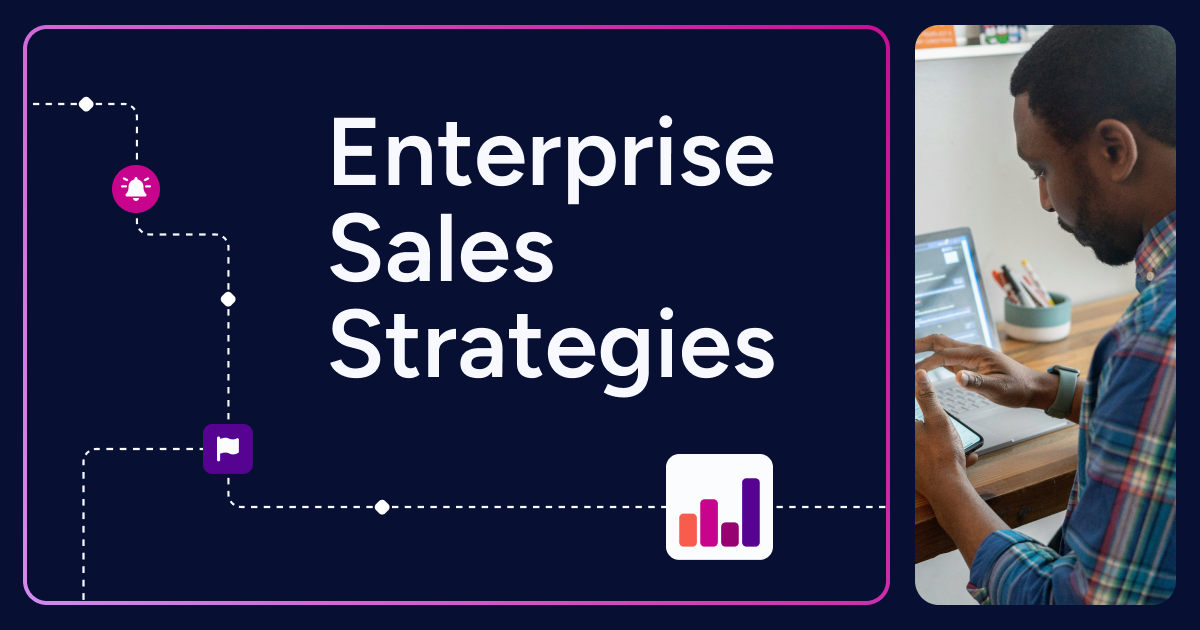Enterprise sales is entering a new era. The tech is smarter. The buyers are sharper. And the playbooks that worked just a few years ago are already stale.
While the complexity has ramped up, so have the tools to win. And the potential is higher than ever.
To succeed, revenue teams must adopt innovative enterprise sales strategies, leverage technology, and master the art of building lasting relationships with enterprise clients.
This comprehensive guide breaks down the key characteristics of enterprise sales, explores proven strategies that win, and shares best practices for navigating the intricate world of complex B2B sales cycles.
Understanding Enterprise Sales
What is Enterprise Sales Strategy?
Enterprise sales, sometimes called complex or high-value sales, involves selling sophisticated solutions to large customers. Think long sales cycles, dozens of stakeholders, and a procurement process that can stall out even the best reps, all for the potential of long-term relationships with customers and very large annual contract values.
Here’s what you’re really up against:
Lengthy sales cycles: Deals can take anywhere from 6 to 24 months to close.
Multiple decision-makers: These deals average 6-10 decision-makers, each with unique priorities.
High contract values: Enterprise deals often involve six- or seven-figure contracts. One deal can make or break the quarter.
Customization required: You’re not selling a SKU, you’re solving a business problem. That means tailored solutions and integration with existing systems.
Rigorous procurement: Legal, compliance, and procurement teams are heavily involved.
Winning in this environment takes more than hustle. You have to have precision.
How is Enterprise Sales Different from Other Sales Models?
Unlike transactional sales that focus on quick, one-off purchases, enterprise sales is a marathon. It’s consultative and relationship-driven. You need a deep understanding of the client’s business to get a foot in the door, let alone win. Success hinges on your ability to navigate organizational hierarchies, address complex pain points, and deliver measurable business value.
Key Strategies for Enterprise Sales Success in 2026
1. Account-Based Marketing (ABM)
ABM has gone from optional to essential. In 2026, the most successful enterprise sales teams treat each target account as a market of one. This means:
Hyper-specific outreach:Tie your pitch to buying signals and craft messaging that speaks directly to each person’s challenges and goals. Mention the CFO’s latest earnings call. Reference that hiring surge in engineering.
Sales and marketing alignment: Real ABM means aligned cadences, shared data, and joint accountability. Teams that get this down see higher engagement and faster deal progression.
Multi-channel engagement: Reach stakeholders where they’re most active to get the most meaningful interactions. Emails alone won’t cut it. Top reps hit every surface: social, events, phone, even mail.
2. Value-Based Selling
Enterprise buyers are under pressure to justify every investment. Your buyers don’t care about features. They care about outcomes. If you can’t prove ROI in the first meeting, don’t expect a second. Here’s how to nail value-based selling:
Quantify ROI: Bring real metrics. “Our customers cut onboarding time by 43%” will land better than “we have a modern user interface.”
Align with strategic priorities: Know their-board level goals — cost reduction, risk mitigation, expansion — and speak that language.
Co-create value: Involve the client in shaping their own solution to build trust and commitment. Workshops beat demos. Show them how your solution adapts to their stack and their goals.
3. Consultative Selling
Enterprise buyers don’t want vendors and pitches. They want partners. Consultative selling requires:
Deep discovery: Go beyond surface-level needs to uncover the client’s true pain points, goals, and constraints. Ask probing questions and listen deeply to find the hidden challenges that even the client hasn’t fully articulated.
Solution mapping: Map your solutions directly to the client’s objectives to make the value proposition clear and compelling.
Continuous education: Teach, don’t pitch. Share thought leadership, market insights, and best practices to help clients make informed decisions. Sales teams that regularly share relevant industry trends and benchmarks make every touchpoint valuable to become a trusted advisor, not just a vendor.
Building Relationships in Enterprise Sales
The Importance of Long-Term Relationships
Enterprise sales is built on trust. Relationships drive revenue.
Winning a deal is just the beginning; long-term success depends on your ability to:
Drive renewals and expansions: Sales teams that maintain regular, value-driven communication post-sale see higher retention and upsell rates. Satisfied clients are more likely to renew contracts and expand their use of your solution.
Become a strategic partner: Become an extension of the team, invested in their ongoing success. Bring new insights to the table. Don’t wait to be asked.
Earn referrals and advocacy: Happy buyers can open doors to new opportunities within their organization and network. Help them win internally and exceed expectations, and you’re more likely to be introduced to other business units or referred to peers.
Stakeholder Management Techniques
Managing multiple stakeholders is one of the biggest challenges in enterprise sales. Best practices include:
Stakeholder mapping: Identify all influencers, decision-makers, and gatekeepers early in the process. Know who matters and how they think.
Tailored communication: Customize messaging for each stakeholder’s role, priorities, and concerns for more productive conversations. IT wants integration. Finance wants savings. Execs want strategy.
Regular check-ins: Keep lines of communication open to address questions, manage expectations, and build consensus. Regular syncs and clear next steps mean no surprises.
Champion development: Cultivate internal champions who can advocate for your solution and help navigate internal politics. These champions can provide critical insights and help overcome internal resistance.
Best Tools and Practices for Enterprise Sales
Technology is a competitive advantage for enterprise sellers. The most successful sales teams harness the power of Go-to-Market Intelligence to drive every stage of the sales process.
Sales intelligence: Use advanced data platforms to identify high-potential accounts, predict deal outcomes, and surface actionable insights from sales conversations. See who’s in-market, who’s growing, and who’s ready. This intelligence also helps uncover new buying centers and expansion opportunities within existing accounts. Our list of best AI Sales Intelligence Software Tools ranks the following as the top 3 platforms:
1. ZoomInfo
2. LinkedIn Sales Navigator
3. Seamless AI
Sales engagement platforms: Ensure no opportunity falls through the cracks by automating personalized outreach, tracking engagement, and optimizing follow-up. Keep stakeholders engaged throughout the sales cycle, using insights from go-to-market platforms to inform every interaction.
CRM and analytics: Real-time visibility into pipeline health, accurate forecasting, and identification of bottlenecks is now standard. Regularly analyze your sales data — enriched with go-to-market intelligence — to spot trends, adjust strategies proactively, and drive more predictable growth.
Enterprise sales without GTM Intelligence is guesswork. The best teams don’t chase — they know where to go, who to hit, and what to say.
Best Practices for Navigating Complex Sales Cycles
Enterprise sales cycles are long and winding. To stay on track:
Do your homework: Research the client’s business, industry trends, and competitive landscape before every interaction. Come prepared with relevant insights to build credibility and trust from the outset.
Build a multi-threaded approach: Engage multiple stakeholders across departments to reduce risk and increase deal momentum. Teams that develop relationships with both champions and skeptics are better equipped to navigate internal dynamics.
Maintain a value-driven narrative: Keeping the focus on business outcomes and ROI at every stage of the process helps maintain alignment and urgency. Revisit the value proposition regularly, especially as new stakeholders join the conversation.
Leverage technology: Using automation and analytics to streamline tasks, track progress, and identify next steps frees up time for high-value activities like relationship-building and strategic planning.
Stay agile: Be prepared to adapt your approach as client needs, priorities, or market conditions change. Teams that regularly review and adjust their account strategies are more resilient and successful.
Document everything: Keep detailed records of conversations, commitments, and next steps to ensure alignment and accountability, especially in long, complex sales cycles.
Specific Strategies for Enterprise Software Sales
Specific strategies for enterprise software sales, sometimes referred to as “enterprise SaaS sales,” can vary from other enterprise sales strategies due to:
Advanced product capabilities
Relationship management
Cross-functional collaboration
Targeted marketing
Because of their product’s subscription model, enterprise SaaS sellers focus heavily on service, customization, and relationship building. The enterprise SaaS sales process often requires an even longer sales cycle with complex negotiations and stakeholder alignment.
Predictions for Enterprise Sales in 2026 and beyond
As we look to the future, several trends will shape enterprise sales:
Increased reliance on AI and automation to drive efficiency and insight.
Greater emphasis on value and outcomes as buyers demand clear ROI.
More collaborative, cross-functional selling as deals become more complex.
Continued shift to virtual and hybrid selling environments.
Enterprise sales is more challenging than ever. But it's also more rewarding. By embracing these enterprise sales strategies for 2026, investing in technology and go-to-market intelligence, and focusing on long-term relationships, sales professionals and organizations can thrive in even the most complex B2B environments.
Ready to elevate your enterprise sales strategy? Start by implementing these best practices, leveraging the latest technology, and always keeping the client’s business outcomes at the center of your approach.


